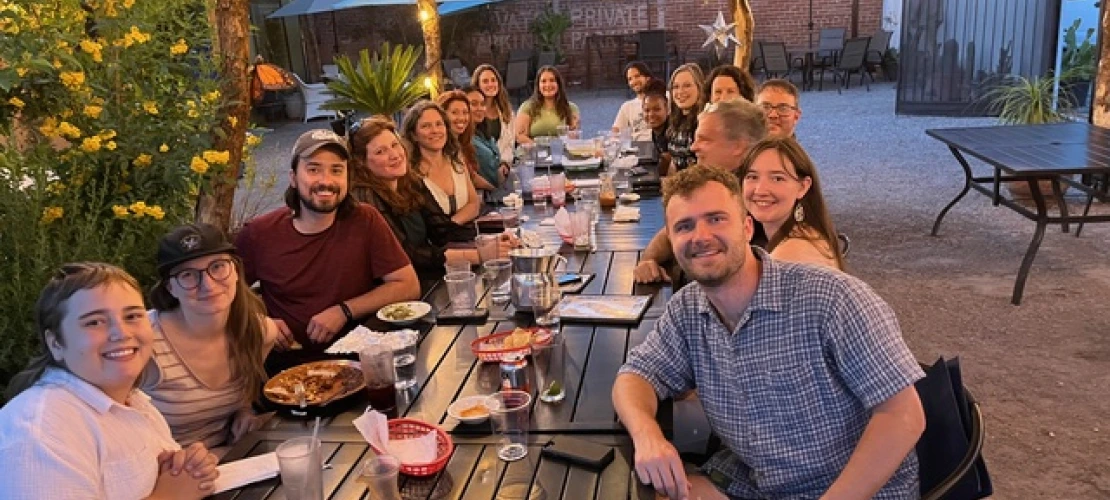
Ecosystem Genomics is an emergent, interdisciplinary area of study that integrates across biotic systems "from genes to ecosystems", with the aim of solving grand challenges in sustainability and innovation in a rapidly changing world. By bringing together ecosystem- and genomic sciences in a framework that connects ecology, sustainability, data science, and applications, ecosystem genomics students have the potential to flourish in diverse careers in industry, government, academia, and non-profit sectors.
The ultimate aim of the Ecosystem Genomics GIDP (ECGN GIDP) is to foster a diverse new generation of transdisciplinary scientists to address the challenges of sustaining natural and managed ecosystems on which humans depend, including wildlands, agricultural systems, forests, arid lands, and marine environments. The coursework supported by this minor will help students think across scales as they develop skills in ecosystem science, genomics, interdisciplinarity, scientific communication, and collaboration.
At is core the minor will foster and extend students’ excellence in areas such as data science, microbiology, plant sciences, insect science, environmental science, atmospheric science, animal and comparative biomedical sciences, biosystems engineering, genetics, ecology and evolutionary biology, geography, and information science, and it is intended to attract students majoring in these UArizona programs. We seek students who want to translate ideas into meaningful scientific advances while cultivating deep and broad skill sets to solve grand challenges relevant to regional, national, and international issues in sustainability and innovation.
GIDP students work towards their ECGN GIDP graduate certificates and minors through participation in the BRIDGES program.
Building Resources for InterDisciplinary training in Genomic and Ecosystem Sciences (BRIDGES) is a NSF-funded graduate training program that supports outstanding MS and Phd graduate students interested in contributing their diverse perspectives to this leading-edge interdiscipline.
Our Values
We are committed to building an inclusive and equitable training and research environment that supports a diverse cohort of trainees, faculty, and partners. We strongly encourage and welcome students representing all forms of diversity.
We respectfully acknowledge the University of Arizona is on the land and territories of Indigenous peoples. Today, Arizona is home to 22 federally recognized tribes, with Tucson being home to the O’odham and the Yaqui. Committed to diversity and inclusion, the University strives to build sustainable relationships with sovereign Native Nations and Indigenous communities through education offerings, partnerships, and community service.

Program Elements
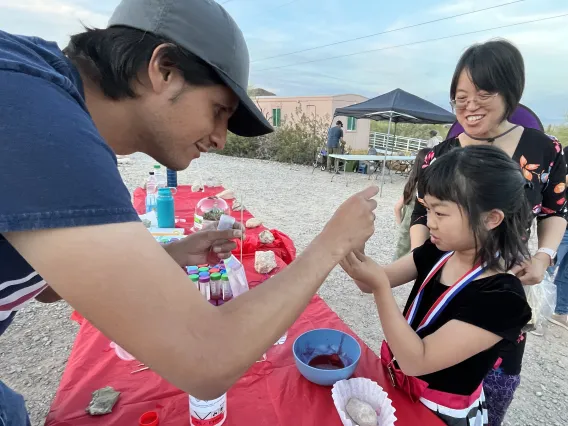
Mentorship/Teaching/Outreach
Every trainee mentors an undergraduate or high school researcher, ideally students in thriving minority-recruiting/retention programs at U of A or through local community partners.
Trainees also complete 20 public engagement hours of public engagement at U of A outreach events, at schools, or elsewhere. They may also mentor newer trainees and/or teach in an undergraduate course relevant to their discipline.
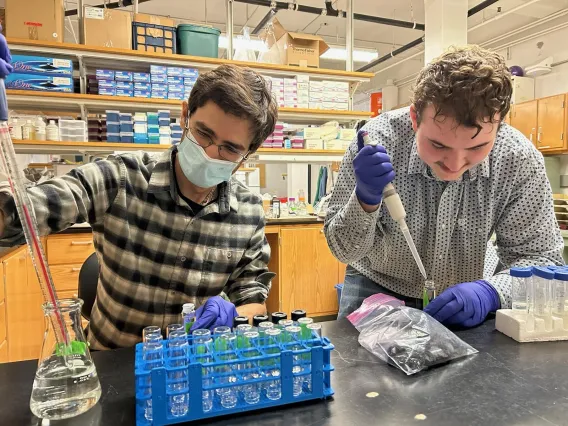
Team Research
Research training is fostered through ‘ecosystem genomics’ opportunities in settings such as national labs, startup or established companies, research institutes, or experimental facilities. Trainees team up to refine their research project ideas into proposals over the course of the first year, presenting these for feedback at the Convergence Institute, before implementing the research. Ideally, research teams will publish their results as co-first authored work to develop their team-based skills and address the challenges of interdisciplinary work.
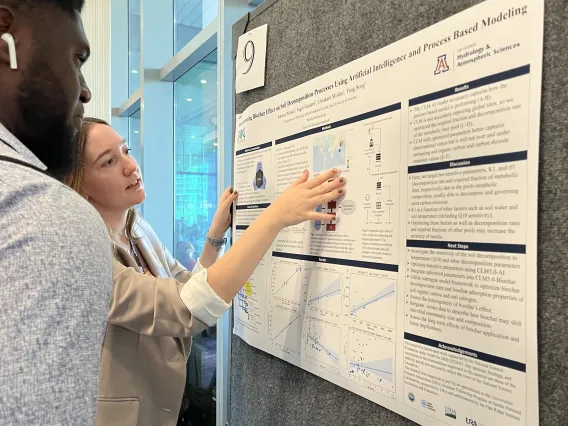
Professional Development
BRIDGES trainees receive professional leadership and communication training from faculty, university, and partner leaders in the Ecosystem Genomics Seminar, hour-long talks, and engagement-style workshops.
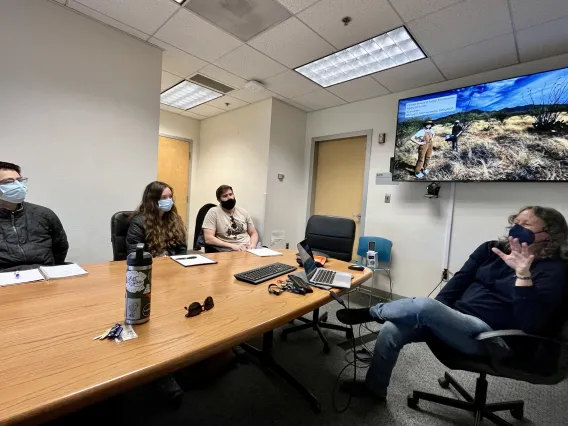
MS/PhD Curriculum
Trainees major in one of the core graduate programs, enrolling in our GIDP to earn a PhD Minor or graduate certificate in ecosystem genomics. Mentored or co-mentored by NRT faculty, trainees complete discipline-specific courses on a normal schedule that includes coursework in three of four target areas: communication and dissemination, ecosystem/earth sciences, genomics biology, and data analytics.
Trainees also enroll for two consecutive semesters in our weekly Ecosystem Genomics Seminar, which features special training sessions, invited speakers and in-class discussions.
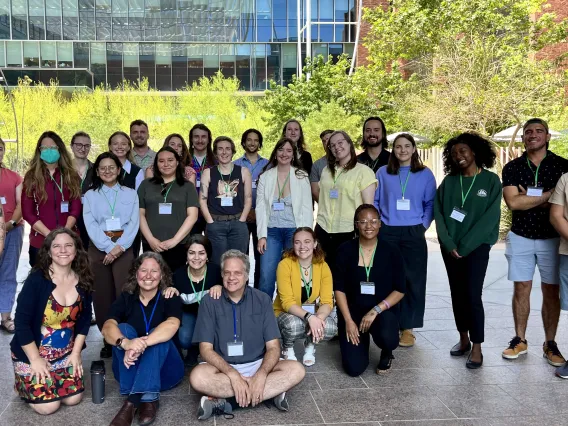
Convergence Institute
Each May, our Ecosystem Genomics community comes together for a 2-3 day summit meeting that is equal parts science, training, inclusion, professional development, and science communication. A pre-session for graduate students offers opportunities for additional professional development.
Year one trainees advance proposals and receive supportive feedback. Returning trainees present results from their team-based research experiences. Participants expand their skills in outreach, inclusion, and professional collaboration in a transdisciplinary setting. This is the flagship event of our program in which we grow and celebrate our diversity and scientific endeavors. Learn more
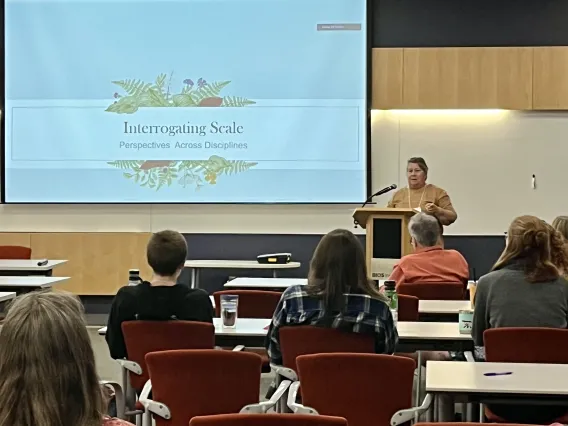
Cultures of Science
Cultures of Science Training is based on the insight that truly transdisciplinary research is not just a technical challenge, but also one of bridging cultural differences among disciplines. The Cultures of Science research and training embraces science as a culturally infused practice with distinct and diverse ways of knowing. Each first year trainee will participate in workshops focusing on the special professional opportunities and challenges of interdisciplinary research.
Our Cultures of Science Team members include: Jennifer Croissant, Associate Professor, Gender and Women's Studies; Erin Leahey, Professor, Sociology ; and Christine Beach, PhD student, Higher Education.
PhD students: Complete an interest form https://docs.google.com/forms/d/e/1FAIpQLSdtdk2Yd9ELcj_eER5pQmyS4Kii_nkOicOhY0Hz7EyCuiO5oQ/viewform
MS students: Reach out to leadership, then complete an application https://apply.grad.arizona.edu/users/login
View our handbook to learn more about the program and requirements. View our handbook: https://docs.google.com/document/d/1cNwtn3AF4yqt8nKGstgR54T8ZwKPFJ4B/
Ecosystem Genomics
Animal and Comparative Biomedical Sciences
Biosystems Engineering
Ecology and Evolutionary Biology
Environmental Science
Geography, Development & the Environment
Genetics GIDP
Hydrology and Atmospheric Sciences
Information
Insect Sciences GIDP
Natural Resources and the Environment
Plant Sciences
Cultures of Science
Gender and Women's Studies
Sociology







